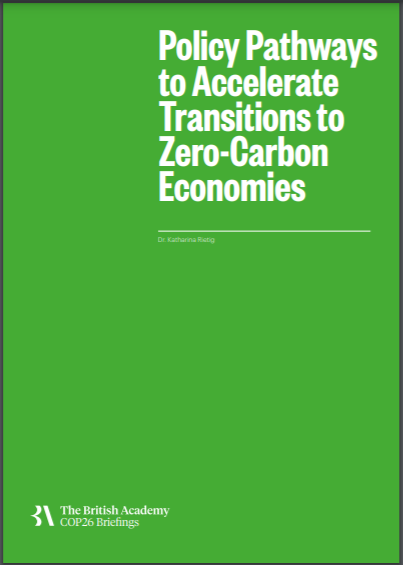
This article is part of the ISC’s Transform21 series, which features resources from our network of scientists and change-makers to help inform the urgent transformations needed to achieve climate and biodiversity goals.
As long-time followers of climate policy – and visitors to this website – will recall, every few years there are moments that really stand out, when anticipation builds in a way that makes it seem as though we’re living through a really decisive moment – there was the run-up to Copenhagen in 2009, Rio in 2012, Paris in 2015 and now Glasgow, in 2021.
As the health crisis of COVID-19 recedes in many countries, and attention turns to the economic recovery, could 2021 be one of those windows of opportunity where there’s a chance of real, lasting change?
That was one of the first questions I put to Dr Katharina Rietig, author of the recent British Academy briefing note on Policy Pathways to Accelerate Transitions to Zero-Carbon Economies:
“What we have seen over the last twenty years is that these windows of opportunity come in waves. Often a lot of things work together – political will, public pressure, available policy solutions – and also dedicated individuals in the right positions of power who are willing to push and make that change. If all those things come together, then we have those windows of opportunity.”
Katharina Rietig
Those windows of opportunity generally don’t stay open for long, says Rietig. They’re often pushed out because a crisis comes along and suddenly gets all of the public and political attention. What makes this moment exceptional, however, is that the crisis is the starting point: a number of major players are now simultaneously developing green recovery plans following the COVID-19 pandemic.
The recovery plan for Europe is backed by the largest stimulus package ever, framed around building a greener, more digital and more resilient Europe. Japan is taking on what it calls the “Three Transitions” challenge, with the aim of achieving net zero greenhouse gas emissions by 2050. China, the world’s largest emitter of carbon dioxide, has pledged their ‘aim to have CO2 emissions peak before 2030 and achieve carbon neutrality before 2060’. In the United States, the CLEAN Future Act of 2021 (CFA) sets a national goal to achieve net zero or negative greenhouse gas emissions by no later than 2050. And India – the world’s third largest emitter – is said to be considering a 2050 (or even 2047) net zero target. No government wants to be seen as a laggard, and so it seems likely that more and more countries will announce ambitious targets.
The Fridays for Future and youth climate movements have really helped to build public awareness and push climate change to the top of the political agenda, says Rietig. This kind of action from civil society is important in helping to maintain momentum, especially as green recovery plans move into the crucial phase of policy implementation later this year and into 2022.
In the briefing note, Katharina Rietig argues for a mixture of different policy instruments that can be implemented across different sectors for transitioning to zero-carbon economies. As well as the green recovery plans being developed now, these different policy instruments can be the basis for efficient Nationally Determined Contributions (NDCs) which set out how countries will work towards meeting the Paris Agreement.
The kind of policy instruments that have been demonstrated to work include what the briefing note refers to as ‘command and control’ options, which combine regulation and follow-up monitoring. An example would be setting standards for permissible levels of air pollutants, and mandating specific technology standards to reduce pollutants, and then monitoring and continuing to enforce standards over the longer term. These kind of approaches can be supplemented by subsidies, taxes, market-based instruments and voluntary agreements to encourage and financially incentivise positive climate action at the same time as discouraging action that degrades the environment.
As the Intergovernmental Panel on Climate Change (IPCC) and many other expert groupings have warned, stronger action on reducing emissions is urgently needed, and it needs to be maintained over a long period of time in order to get on an emissions reduction pathway consistent with limiting global warming. To match this need, policies need to be designed in a way that makes them durable, and not likely to be affected by unexpected events or changes in domestic politics that might lead to their reversal or watering-down.
This kind of resilience can be built-in to policies through measures that make them difficult to reverse, such as provisions in the constitution, or by ‘future-proofing’ policies in a way that means they have increasing returns, allow for positive feedbacks, can adapt in response to new scientific evidence or technologies, and contain self-reinforcing dynamics. For example, policies could be designed to create vested interests among actors who expect their investments to pay off in the future, and would therefore object to the policy being weakened or reversed. In addition, in line with the emissions cuts required, policies for a zero-carbon transition need to be able to be gradually tightened in way that doesn’t require costly action or extensive debate, so as to maintain their political feasibility and acceptability.
In order to support the kind of zero-carbon economic transitions required, there are a number of policy options out there. What’s key is that policies are integrated and coherent, so as to avoid conflicts or unintended consequences. A starting point for designing policy pathways for zero-carbon economies is therefore to evaluate all existing sectoral policies for zero-carbon transitions, and adapt them accordingly.
Katharina Rietig also works with civil society and non-governmental organizations, as well as representatives of cities who are involved in climate negotiations, and makes clear that their involvement is also necessary for zero-carbon pathways. Cities now account for 50% of the global population and 65% of global energy demand, so policy design at the city level needs to be integrated with national policy instruments. At the same time, exploring opportunities in business and industry value chains, and working with civil society organizations that can help encourage behaviour change, can also help to strengthen action for zero-carbon economies.
Innovations such as Artificial Intelligence can help support uptake of low-carbon technologies and more efficient energy use, as well as driving innovation and economic growth.
However, the implementation of new technologies is a good example of how zero-carbon transitions may involve risks at the same time as providing benefits. Increasing automation may lead to job losses in certain sectors, and technologically-advanced energy efficient products may not be available to all. Data emanating from smart systems or machine learning algorithms could be hacked, causing a security risk or revealing personal data.
Transitioning to zero or low-carbon economies will create disruption, and not everyone will benefit equally. In order to ensure the kind of long-term coherence and stability that’s essential for implementing the policies required, public support must be maintained over the long term. That’s why Katharina Rietig underlines the need for social policies that can cushion any negative effects of the transition. We already have examples of public backlash towards policies that appear to increase energy prices, and populist political parties have been quick to capitalise on this kind of thinking by appealing directly to those left behind by the green transition, further undermining support for green policies. Any zero-carbon transition needs to be socially inclusive in order to have a chance of long-term success.
The financial resources needed to provide social ‘cushioning’ for those left behind do exist, says Rietig, and could be unlocked through divestment, or by the removal of fossil fuel subsidies. They could also be directly linked to the revenues generated from market-based instruments such as through carbon/ eco taxes or emission trading and fines. Many investment funds have already started to divest from fossil fuels, and fossil fuel industry giants are increasingly investing in renewables and green start-ups to broaden their portfolios and become ‘energy’ companies more generally.
When one considers that these kind of self-fulfilling cycles are already having an effect in the fossil fuel sector, at the same time as countries are setting ambitious targets for emissions reductions and civil society movements are making the headlines, it’s easy to feel hopeful that 2021 can really be an opportunity for change. And the Briefing Paper does end on an upbeat note: ‘Countries can ensure successful COVID-19 recoveries through low or zero-carbon economic transitions’. But really making a transition, the paper cautions, will require a holistic approach that is underpinned by international cooperation, mutual learning and capacity building.

Policy Pathways to Accelerate Transitions to Zero-Carbon Economies
Katharina Rietig, Policy Pathways to Accelerate Transitions to Zero-Carbon Economies, The British Academy, UK.
Katharina Rietig is Senior Lecturer (Associate Professor) in International Politics at the School of Geography, Politics and Sociology at Newcastle University, UK. She holds a British Academy and Wolfson Foundation Fellowship on ‘Climate Smart Cities: Responsible Policies for Governing Artificial Intelligence in Transitions to Low-Carbon Societies’.
Photo by Nick Fewings on Unsplash.